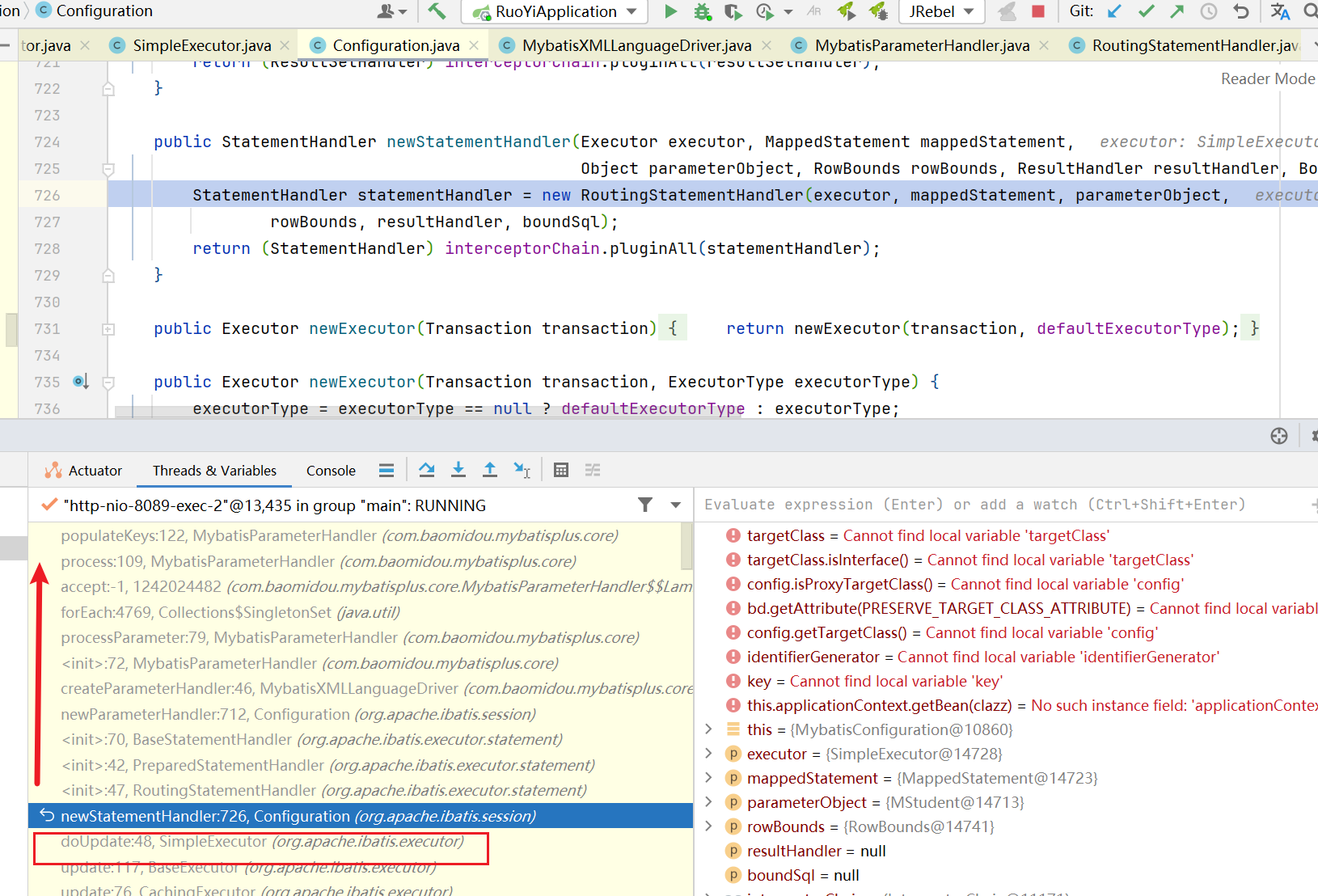一、自动配置类
一、自动配置是springboot的一个特点,mybatisplus自动配置类是MybatisPlusAutoConfiguration.java,下面一段源码中可以看到如果从IOC容器中可以获取IdentifierGenerator类型的组件则,设置到globalConfig中,否则globalConfig中的IdentifierGenerator是空。如果不设置会使用默认的DefaultIdentifierGenerator.java
GlobalConfig globalConfig = this.properties.getGlobalConfig();
this.getBeanThen(MetaObjectHandler.class, globalConfig::setMetaObjectHandler);
this.getBeanThen(AnnotationHandler.class, globalConfig::setAnnotationHandler);
this.getBeanThen(PostInitTableInfoHandler.class, globalConfig::setPostInitTableInfoHandler);
this.getBeansThen(IKeyGenerator.class, i -> globalConfig.getDbConfig().setKeyGenerators(i));
this.getBeanThen(ISqlInjector.class, globalConfig::setSqlInjector);
//这里是从IOC容器中获取IdentifierGenerator类型组件放入到GlobalConfig
this.getBeanThen(IdentifierGenerator.class, globalConfig::setIdentifierGenerator);
factory.setGlobalConfig(globalConfig);
return factory.getObject();
}
/**
* 检查spring容器里是否有对应的bean,有则进行消费
*
* @param clazz class
* @param consumer 消费
* @param <T> 泛型
*/
private <T> void getBeanThen(Class<T> clazz, Consumer<T> consumer) {
if (this.applicationContext.getBeanNamesForType(clazz, false, false).length > 0) {
consumer.accept(this.applicationContext.getBean(clazz));
}
}
2、继续跟踪代码MybatisSqlSessionFactoryBean执行getObject()方法,
->afterPropertiesSet()->buildSqlSessionFactory()中执行 靠后可以跟踪到 final SqlSessionFactory sqlSessionFactory = this.sqlSessionFactoryBuilder.build(targetConfiguration);
继续看build方法进入MybatisSqlSessionFactoryBuilder中bulid如下:
public SqlSessionFactory build(Configuration configuration) {
GlobalConfig globalConfig = GlobalConfigUtils.getGlobalConfig(configuration);
final IdentifierGenerator identifierGenerator;
//如果没有设置自定义主键生成器,会生成DefaultIdentifierGenerator放入到GlobalConfig
if (null == globalConfig.getIdentifierGenerator()) {
GlobalConfig.Sequence sequence = globalConfig.getSequence();
if (sequence.getWorkerId() != null && sequence.getDatacenterId() != null) {
identifierGenerator = new DefaultIdentifierGenerator(sequence.getWorkerId(), sequence.getDatacenterId());
} else {
NetUtils.NetProperties netProperties = new NetUtils.NetProperties(sequence.getPreferredNetworks(), sequence.getIgnoredInterfaces());
InetAddress inetAddress = new NetUtils(netProperties).findFirstNonLoopbackAddress();
identifierGenerator = new DefaultIdentifierGenerator(inetAddress);
}
globalConfig.setIdentifierGenerator(identifierGenerator);
} else {
identifierGenerator = globalConfig.getIdentifierGenerator();
}
IdWorker.setIdentifierGenerator(identifierGenerator);
if (globalConfig.isEnableSqlRunner()) {
new SqlRunnerInjector().inject(configuration);
}
SqlSessionFactory sqlSessionFactory = super.build(configuration);
// 缓存 sqlSessionFactory
globalConfig.setSqlSessionFactory(sqlSessionFactory);
return sqlSessionFactory;
}
如果没有设置自定义主键生成器,会生成DefaultIdentifierGenerator放入到GlobalConfig中,所以不设置会使用DefaultIdentifierGenerator中的主键生成方法。
策略类型与生成器映射
| IdType | 对应生成器 |
|---|---|
| ASSIGN_ID | 自定义/默认生成器 调用nextId() |
| ASSIGN_UUID | 自定义/默认生成器 调用nextUUID() |
| INPUT | 用户自行输入 |
| AUTO | 数据库自增 |
二、自定义主键生成器调用
Mybatisplus在启动,解析mapper.xml时会往mappedStatement中放入insert、delete等方法,可以供开发者直接使用。mybatisplus中把mapper通过jdk代理生成MybatisMapperProxy.java,使用mybatisplus拓展的增删改查方法时,会调用MybatisMapperProxy中的invoke,最终调用MybatisMapperMethod.execute->org.mybatis.spring.SqlSessionTemplate.insert->org.apache.ibatis.session.defaults.DefaultSqlSession.insert跟踪到org.apache.ibatis.executor.SimpleExecutor.doUpdate
@Override
public int doUpdate(MappedStatement ms, Object parameter) throws SQLException {
Statement stmt = null;
try {
Configuration configuration = ms.getConfiguration();
StatementHandler handler = configuration.newStatementHandler(this, ms, parameter, RowBounds.DEFAULT, null, null);
stmt = prepareStatement(handler, ms.getStatementLog());
return handler.update(stmt);
} finally {
closeStatement(stmt);
}
}
在configuration.newStatementHandler(this, ms, parameter, RowBounds.DEFAULT, null, null),可以看到调用栈

定位到MybatisParameterHandler构造器里面的processParameter(parameter);当执行insert和update时会进入 extractParameters(parameter).forEach(this::process);
public void processParameter(Object parameter) {
/* 只处理插入或更新操作 */
if (parameter != null && !SimpleTypeRegistry.isSimpleType(parameter.getClass())) {
if (SqlCommandType.INSERT == this.sqlCommandType || SqlCommandType.UPDATE == this.sqlCommandType) {
extractParameters(parameter).forEach(this::process);
}
}
}```
可以看到每个参数会循环执行process,其中populateKeys就是设置主键的方法。
```java
private void process(Object parameter) {
if (parameter != null) {
TableInfo tableInfo = null;
Object entity = parameter;
if (parameter instanceof Map) {
// 处理单参数使用注解标记的时候,尝试提取et来获取实体参数
Map<?, ?> map = (Map<?, ?>) parameter;
Object et = null;
if(map.containsKey(Constants.ENTITY)){
et = map.get(Constants.ENTITY);
} else if(map.containsKey(Constants.MP_FILL_ET)){
et = map.get(Constants.MP_FILL_ET);
}
if (et != null) {
entity = et;
tableInfo = TableInfoHelper.getTableInfo(entity.getClass());
}
} else {
tableInfo = TableInfoHelper.getTableInfo(parameter.getClass());
}
if (tableInfo != null) {
//到这里就应该转换到实体参数对象了,因为填充和ID处理都是针对实体对象处理的,不用传递原参数对象下去.
MetaObject metaObject = this.configuration.newMetaObject(entity);
if (SqlCommandType.INSERT == this.sqlCommandType) {
populateKeys(tableInfo, metaObject, entity);
insertFill(metaObject, tableInfo);
} else {
updateFill(metaObject, tableInfo);
}
}
}
}
这里还可以看到insertFill和updateFill方法实现了MetaObjectHandler接口,并添加到IOC容器的组件可以在这执行insertFill和updateFill,一般用作统一设置创建时间,创建人或修改时间,修改人的操作。现在重点看下当执行insert的时候populateKeys方法。总体来看就是在给sql参数赋值时,设置参数值。
protected void populateKeys(TableInfo tableInfo, MetaObject metaObject, Object entity) {
final IdType idType = tableInfo.getIdType();
final String keyProperty = tableInfo.getKeyProperty();
if (StringUtils.isNotBlank(keyProperty) && null != idType && idType.getKey() >= 3) {
final IdentifierGenerator identifierGenerator = GlobalConfigUtils.getGlobalConfig(this.configuration).getIdentifierGenerator();
Object idValue = metaObject.getValue(keyProperty);
if (identifierGenerator.assignId(idValue)) {
if (idType.getKey() == IdType.ASSIGN_ID.getKey()) {
Number id = identifierGenerator.nextId(entity);
metaObject.setValue(keyProperty, OgnlOps.convertValue(id, tableInfo.getKeyType()));
} else if (idType.getKey() == IdType.ASSIGN_UUID.getKey()) {
if(String.class.equals(tableInfo.getKeyType())) {
metaObject.setValue(keyProperty, identifierGenerator.nextUUID(entity));
} else {
log.warn("The current ID generation strategy does not support: " + tableInfo.getKeyType());
}
}
}
}
}
可以看到StringUtils.isNotBlank(keyProperty) && null != idType && idType.getKey() >= 3时会从globalConfig中获取主键生成器,如果有自定义的就从这获取,没有的话就是DefaultIdentifierGenerator.java下面是IdType的代码。
public enum IdType {
AUTO(0),
NONE(1),
INPUT(2),
ASSIGN_ID(3),
ASSIGN_UUID(4);
private final int key;
private IdType(int key) {
this.key = key;
}
public int getKey() {
return this.key;
}
}
会判断 实体类中主键@TableId注解中的配置,如何IdType.ASSIGN_ID会调用主键生成器的nextId, IdType.ASSIGN_UUID则调用nextUUID,给需要执行的sql参数赋值。
if (idType.getKey() == IdType.ASSIGN_ID.getKey()) {
Number id = identifierGenerator.nextId(entity);
metaObject.setValue(keyProperty, OgnlOps.convertValue(id, tableInfo.getKeyType()));
} else if (idType.getKey() == IdType.ASSIGN_UUID.getKey()) {
if(String.class.equals(tableInfo.getKeyType())) {
metaObject.setValue(keyProperty, identifierGenerator.nextUUID(entity));
} else {
log.warn("The current ID generation strategy does not support: " + tableInfo.getKeyType());
}
}